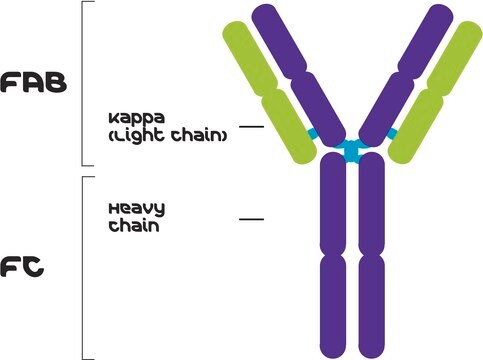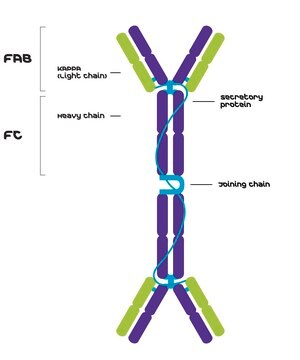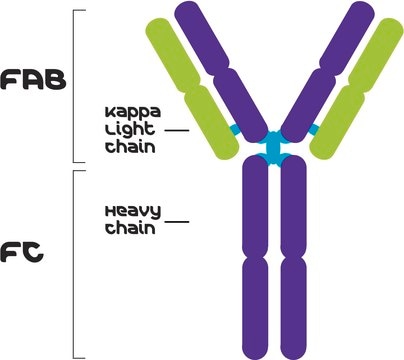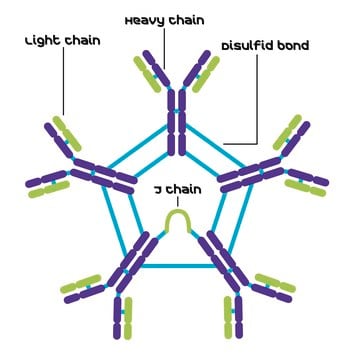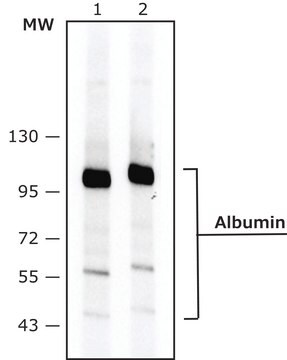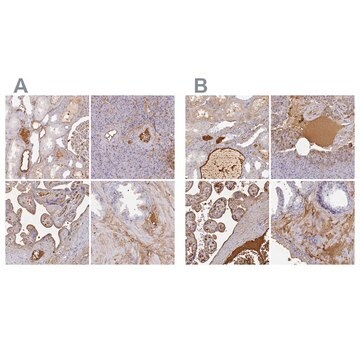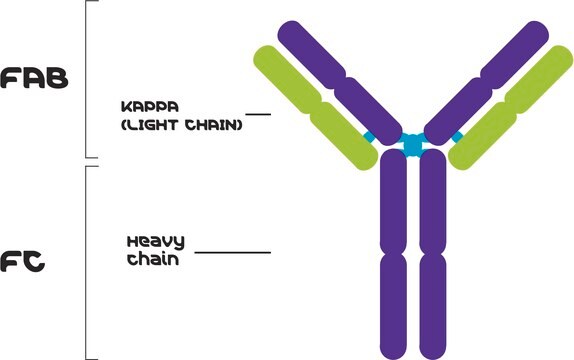M5409
Mouse IgG2a Isotype Control from murine myeloma
clone UPC-10, purified immunoglobulin, buffered aqueous solution
Sign Into View Organizational & Contract Pricing
All Photos(1)
About This Item
UNSPSC Code:
12352203
NACRES:
NA.46
Recommended Products
biological source
mouse
Quality Level
antibody form
purified immunoglobulin
antibody product type
primary antibodies
clone
UPC-10, monoclonal
form
buffered aqueous solution
technique(s)
flow cytometry: suitable
shipped in
wet ice
storage temp.
2-8°C
target post-translational modification
unmodified
Related Categories
General description
Immunoglobulin G (IgG) belongs to the immunoglobulin family and is a widely expressed serum antibody. An immunoglobulin has two heavy chains and two light chains connected by a disulfide bond. It is a glycoprotein. IgG is a major class of immunoglobulin. Mouse consists of five immunoglobulin classes- IgM, IgG, IgA, IgD and IgE. Mouse IgG is further divided into five classes- IgG1, IgG2a, IgG2b and IgG3.
Isotype controls are non-reactive immunoglobulins of the same isotype as the primary antibody being used in an application. It is recommended that a non-reactive immunoglobulin of the same isotype and concentration be included as a negative control for each monoclonal antibody reagent used in flow cytometry or other immunoassays.
Specificity
When evaluated in flow cytometry, the product did not stain human peripheral blood lymphocytes (PBLs). Anti-Mouse IgG (whole molecule), F(ab′)2 fragment FITC, Catalog Number F2883, along with 1 mg of the product was incubated with human PBLs and then evaluated by flow cytometry.
Application
Mouse IgG2a Isotype Control from murine myeloma has been used in:
- immunoprecipitation
- enzyme-linked immunosorbent assay (ELISA)
- fluorescence microscopy
- indirect immunocytochemistry
Biochem/physiol Actions
Immunoglobulin G (IgG) participates in hypersensitivity type II and type III reactions. It mainly helps in immune defense. IgG helps in opsonization, complement fixation and antibody dependent cell mediated cytotoxicity. IgG2a has cytotropic properties and IgG2 molecules have the ability to activate the complement system.
Physical form
Solution in 0.01 M phosphate buffered saline, pH 7.4, containing 1% bovine serum albumin and 15 mM sodium azide.
Disclaimer
Unless otherwise stated in our catalog or other company documentation accompanying the product(s), our products are intended for research use only and are not to be used for any other purpose, which includes but is not limited to, unauthorized commercial uses, in vitro diagnostic uses, ex vivo or in vivo therapeutic uses or any type of consumption or application to humans or animals.
Not finding the right product?
Try our Product Selector Tool.
Storage Class Code
10 - Combustible liquids
WGK
WGK 3
Flash Point(F)
Not applicable
Flash Point(C)
Not applicable
Personal Protective Equipment
dust mask type N95 (US), Eyeshields, Gloves
Choose from one of the most recent versions:
Already Own This Product?
Find documentation for the products that you have recently purchased in the Document Library.
Customers Also Viewed
David M Markusic et al.
Human gene therapy, 18(7), 673-679 (2007-07-17)
One of the problems that limit the efficiency of viral gene therapy is the lack of specificity of viral particle binding. The development of techniques to target viral particles to specific cell types is therefore important. Because GP64 can efficiently
The Immunoglobulins: Structure and Function, 575-586 (1998)
Vivian M deZengotita et al.
Biotechnology and bioengineering, 78(7), 741-752 (2002-05-10)
Elevated pCO(2) inhibits cell growth. This growth inhibition is accompanied by a decrease in intracellular pH (pHi), as well as a decrease in glycolysis. Elevated concentrations (mM) of some amino acids have been shown by others to protect cells exposed
Activation of the p53 pathway induces alpha-smooth muscle actin expression in both myeloid leukemic cells and normal macrophages
Secchiero P, et al.
Journal of Cellular Physiology, 227(5), 1829-1837 (2012)
Molecular Genetics of Immunoglobulin, 17, 575-586 (1987)
Our team of scientists has experience in all areas of research including Life Science, Material Science, Chemical Synthesis, Chromatography, Analytical and many others.
Contact Technical Service




